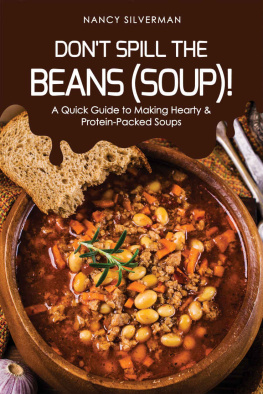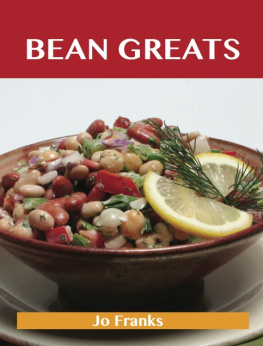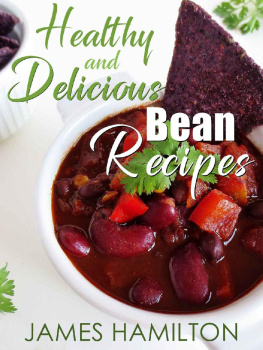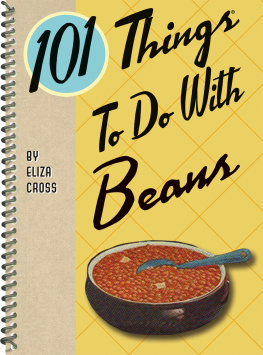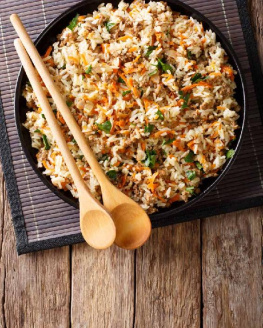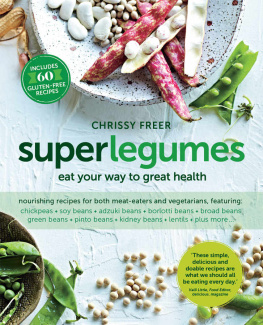HEIRLOOM BEANS

HEIRLOOM BEANS
Great Recipes for Dips and Spreads, Soups and Stews, Salsas and Salads, and Much More from
Rancho Gordo
STEVE SANDOandVANESSA BARRINGTON
Photographs bySARA REMINGTONForeword byTHOMAS KELLER

DEDICATION
This book is dedicated to anyone who has ever put a seed in the ground and enjoyed the miracle that follows.
FOREWORD
I HAVE ALWAYS LOVED BEANS. I remember eating navy bean soup as a child... it was one of my favorite dishes even when it was not homemade and came out of a can. As I grew older and my palate matured, cassoulet became another favorite winter dish enjoyed with family and close friends. These food experiences bring me great comfort, as their flavors and textures are inextricably linked to memories of kinship and joyful occasions in my life.
It therefore comes as no surprise that we feature many varieties of beans on our menu. They are one of those comfort foods that evoke a sense of warmth and nostalgia, as well as a sense of wonder within us. If you have ever had the good fortune of plucking a fresh pod of fava beans and splitting it in the palm of your hand, you will be amazed at what you will discover: a row of softly glistening plump green beans, lined up like little soldiers and nestled in a cottony surrounding. It is as if Mother Nature took such a personal interest that she then carefully enveloped each bean to protect them from harm. At The French Laundry, we painstakingly shell each fava bean by hand. It is quite labor intensive but I assure you, worth every effort. Once peeled, they are cooked quickly to retain the mildly nutty, buttery, and creamy flavors they have become known for. They are my favorite harbinger of spring.
People often ask me what I believe the foundation of good cooking is. Along with flawless technique, certainly the use of high-quality ingredients at the peak of their flavor is foremost. That is the main reason why we carefully nurture our relationship with our purveyors. It is a reciprocal connectionthey provide us with the finest crops available; and as cooks, we in return treat them with respect and showcase them in our dishes in the best possible way. I recall when Steve Sando delivered his first batch of beans to the restaurant and how our cooks gathered around to appraise them with curiosity. The energy and pride he exuded made us eager to cook and experiment with them right away.
Steve and I first met at our local farmers market in Yountville, California, several years ago. What struck me about him then were his earnestness and his knowledge about heirloom beansand of course the eye-catching, multicolored array he had on display. Because he sells his beans new (meaning they are harvested and dried within a year and then sold to the public), they have the most consistent quality I have ever come across. The longer beans are stored, the longer the cooking time needed for them to soften. Less cooking time means their delicate flavors are preserved and that the beans also retain their shape when cooked. Because of these wonderful characteristics, we keep several types of Rancho Gordo beans on hand at all times. At The French Laundry, we have four types of heirloom beans from Steve that we use often: black nightfall, Anasazi, cellini runner, and marrow beans. Our sister restaurant Per Se in New York also utilizes them frequently, as do our casual restaurants Bouchon in Yountville and Las Vegas.
Rancho Gordo has made such an impact that it has followed many chefs who have left our kitchens and who now run their own. For example, our former chef de cuisine Eric Ziebold who went on to head CityZen in Washington D.C., as well as a previous sous chef Ryan Fancher who is now at El Dorado Kitchen in Sonoma, proudly serve Rancho Gordo beans. Steve takes great pride in growing the best he can, in the best possible way he can. His heirloom beans are vastly different from what we have been accustomed to in the past, and people detect a big difference in flavor and texture once they have tried them. His efforts in cultivating these rare and obscure varieties have helped spark renewed interest within food circles.
When Steve approached me to write the foreword for his book, I thought of how beans have played a prominent role in the development of the human race. It also made me remember what I read in Ken Albalas A History of Beans, which mentioned that the birth of civilization thousands of years ago can be attributed to beans. They were one of the first domesticated plants and provided much-needed nutrients to the community when hunters came back empty-handed. The fact that beans have endured and played a great role in human evolution is a testament to their resilience and importance.
Whole countries and societies have sustained themselves on beans for centuries. For example, soybeans are considered one of the five ancient grains in China. The Chinese have found ways to use them in many wayssuch as tofu, noodles, soy sauceeven soybean oil. In India, they have relied on various types of lentils and beans for nourishment, as they are one of the most complete sources of protein for their vegetarian diet.
Beans have sadly not reached the same fervor and acceptance in the United States, as for example, other staples like corn or potatoes, which I find unfortunate. This is why I give my support to Steve and his pursuit of bringing heirloom beans to the fore. His efforts make me feel hopeful on several levels: 1) that his work will help beans find the rightful niche in our culture that they deserve; 2) that on an agricultural level, he will continue to generate more attention to the importance of sustainable farming practices in our country; and finally, 3) that after reading Heirloom Beans, his readers will come away with an understanding of why we are committed to helping him spread the word and why we give Rancho Gordo beans a place of honor at our restaurants.
Thomas Keller, The French Laundry

WELCOME TO RANCHO GORDO
Are these beans vegetarian?
I thought I must have misunderstood the question and asked the young woman what she had said. Vegetarian! Are these beans vegetarian? She roundly slapped several packages of my dried heir-loom beans as if that would help me understand what she was asking.
Do you mean organic? I asked. My middle-aged brain makes funny leaps at times and I could see saying vegetarian when I meant organic. After all, these were uncooked dried beans. Did she think we went to the trouble of dipping the beans in beef bouillon before we dried them?
Clearly she was frustrated with me. No meat. Vegetarian!
Yes, I gently assured her. The beans are vegetarian.
WELCOME TO MY WORLD! Ill try not to climb on my soapbox, but now and then you may find me wondering aloud how we got to a place where people think that beans might have meat in them. Or how we let these heirloom beans slip through our hands for so many generations. Although food politics is beyond the scope of this book, I hope we can begin discussing our collective culinary heritage here in the Americashow to preserve it and how to eat it. My passion is for food that is indigenous to the New World. Its interesting because its our own collective history and yet we know little about it. In these times of borders made of anger and cement, its nice to consider our world in relation to our neighbors, and focus on the things we have in common rather than our differences. Instead of inventing new food traditions or attempting to copy Europes verbatim, Im more interested in looking at the ones we have, which perhaps weve neglected or ignored. What are the foods that have been cultivated here since long before Columbus arrived? Do they grow better here? Are they easier on the land? Do they use less water? How do indigenous foods combine with foods from other parts of the world? I find the whole subject fascinating, and for me the most interesting and neglected indigenous food is the common bean,
Next page

